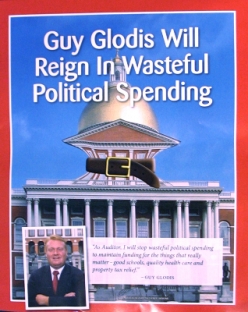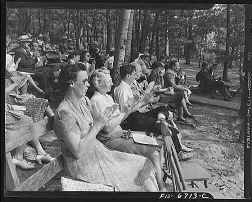Word Woes—homonym horrors III
Author: Ellen Cline; Published: Apr 18, 2011; Category: Editing and Proofing; Tags: editing, homonym errors, proofreading, writing; No Comments

Sometimes you see them, sometimes you don’t.
Although they’re always out there, lurking, periods of time go by where I just don’t notice too many juicy homonym horrors. Then again, sometimes they just seem to be everywhere I look. It’s been a slow period, but here are several I collected in recent months.
Last week I saw one in an invitation to a winery event that sounded really great, even if the food descriptions had gone a bit awry
- This week…will prepare some special hors d’oeuvres in addition to our normal fair. Chef…will serve wild mushroom bites with a red wine sauce, wanton cups filled with mandarin chicken salad and mini onion tartlets with goat cheese. Truly tasty!
I’m sure it all is truly tasty, but when we’re talking about food it’s generally fare, not fair, unless you’re talking about fair trade. As for those wanton cups, just tell them to stop that inappropriate behavior. I’m guessing they meant wonton cups, as in something made from a wonton wrapper.
In March I was reading a really fun and fascinating book, J. Maarten Troost’s “The Sex Lives of Cannibals.” I had barely begun when I came upon this:
- Enwetak was being canvassed as a sight for testing the hydrogen bomb and the drilling indicated that the atoll was suitable for obliteration.
The author explains in the book how some of these atolls are really difficult to spot from the sea until you’re practically right on them, but in this case I think he meant site, as in place or location, not sight, as in able to see something.
In the February issue of Consumer Reports, Goofs, glitches, gotchas section,
someone sent in a Political ad saying:
- Guy Glodis Will Reign in Wasteful Political Spending.
Of course they meant “rein in” not reign in. I don’t think they wanted to say that their candidate was the king of political spending. But you have to visualize reining in a horse and know what reins are to pick the right word.
Glodis lost the race. The power of words?
What’s it like being a freelance writer?
Author: Ellen Cline; Published: Mar 28, 2011; Category: Business Writing; Tags: Business Writing, writing; No Comments

Students in a professional writing class at UNM asked me to answer some questions about being a freelance writer. I realized maybe the things they were asking about were questions others might have as well.
My work is mainly centered on helping people market their products and services. Whether writing web content or a press release, I’m generally helping organizations develop their marketing messages and materials.
The students wanted to know what qualities were needed to be successful. I said self-motivation and flexibility.
I told the students you have to be able to obtain and organize your own work, and meet deadlines. You have to be able to learn new topics very quickly. If something changes on a project, you need to be ready to switch gears. Providing good customer service is essential.
When they asked about the best parts of being a freelancer, I said the ability to choose clients and be in charge of your own work. If you have a variety of clients, you can also learn about a wide variety of topics. This is fun if you are a person who enjoys learning.
Then they asked about bad experiences, and if I’d had any. I said, of course, if you are in any type of business you are going to have bad experiences. The client needs to value what you do. If they don’t see the value in what you do, there will be conflicts.
Another dangerous category of work is when someone wants you to “fix” a project someone else has started. That generally is a formula for disaster. Start fresh.
Over the years, I’ve experienced the good, the bad and the strange with various clients and potential clients. Whether it’s slow payment or someone wanting to read my palm at a first meeting, I’ve seen a lot, although I’m sure not all.
Right now I genuinely like my clients and have good relationships with them. Is this a result of luck or my many years of experience? I think a little of both.
Attracting the Creative Consumer
Author: Ellen Cline; Published: Dec 6, 2010; Category: Business Writing; Tags: Business Writing, promoting nonprofits, Public relations; No Comments

I attended a symposium on the creative economy recently. Because I am part of the communications team and do PR for the Church of Beethoven, I was particularly interested in hearing from the professionals taking part in a panel discussion about the creative consumer.
Who are these people and how do you attract them?
Sophie Martin, of Sophie Martin PR, said one of the main audiences is someone she calls “Elaine,” an empty nester who now has the time and money to attend art and theater events. She is college educated and has been exposed to the arts. Elaine wants to support the arts and she wants to attend with her partner, friend or a group with whom she can discuss the event.
Then there’s “Nate,” a young man who has an interest in bonding with his male friends or getting lucky with a date. He has different expectations than Elaine. Nate wants to have new experiences and topical subjects to talk about.
Along with their hopes for arts and entertainment events, they both have concerns. Elaine is afraid of dangerous situations or driving at night. Nate is worried about unexpected costs. He wants to be clear about what food or parking costs because he doesn’t want to look bad in front of his friends.
Chantal Foster, a web architect, said she sees people trying to launch an advertising campaign to everyone, which of course doesn’t work. She asked how arts organizations can better focus and identify their audiences.
Martin replied that you can go see your colleagues and see who is showing up at their performances, or even look at other cities similar to yours and see what they’re doing. But she said one of the best and most inexpensive things an organization can do is to survey their existing audience. Talking to them gives you a window on who else is out there and how to reach them.
One more point Martin made: Your biggest competition is everything and nothing. It’s all the other arts and entertainment options and it’s people just sitting at home.
Hakim Bellamy, a poet and musician, added that your “competition” is your audience, too, so collaborate and work together.
Hearing all this I got some new ideas but also confirmation that some of the things we’re doing at the Church of Beethoven are the way to go.
We ran a survey for the Church of Beethoven audience members not long ago. We had a very good response rate and now need to more systematically analyze the information we collected. I’m looking forward to seeing what we can learn from the results.












